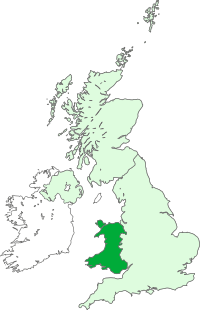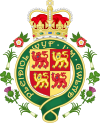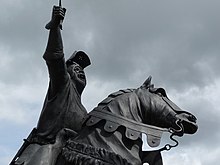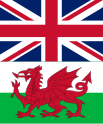
| This article is part of a series within the Politics of the United Kingdom on the |
| Politics of Wales |
|---|
 |
Unionism in Wales is the political view that supports a political union between Wales and the other countries of the United Kingdom (England, Scotland and Northern Ireland). As well as the current state of the UK, unionism may also include support for Federalism in the United Kingdom and a United Kingdom Confederation.
History
[edit]

Edward I of England conquered Wales in 1283.[1] The royal ordinance of the Statute of Rhuddlan in 1284 annexed Wales to England.[2][1][3]
Henry VIII of England introduced the Laws in Wales Acts 1535-1542, making the Welsh citizens of the realm, and giving them representation in parliament for the first time. These acts also abolished the Welsh legal system of Hywel Dda, and the Welsh language could not be used for official purposes. The laws also defined the England-Wales border for the first time.[4] The Marcher Lordships and Principality of Wales, divided by conquest, were reunited.[5][6]
The political union between the Kingdoms of England and Scotland was created through the Act of Union 1707. This united the two previously independent states, which had shared the same monarch in a personal union since 1603, under the Parliament of Great Britain. With the Act of Union 1800, the Kingdom of Ireland united with Great Britain to become the United Kingdom of Great Britain and Ireland. After the partition of Ireland, through which most of Ireland left the United Kingdom in 1922, the state became the United Kingdom of Great Britain and Northern Ireland.[7]
The history of the unions is reflected in various stages of the Union Jack, which forms the flag of the United Kingdom. As Wales had been annexed and was deemed a principality, it was not distinguished from England within the national flag.[8]: 43
Devolution
[edit]The UK is administered as a unitary state, but in the early 1990s, Labour became committed to devolution for both Scotland and Wales, and in 1997 it was elected with a mandate to hold referendums on a Scottish Parliament and a Welsh Assembly.[9] The proposed assembly won a narrow majority in the 1997 referendum. The political climate was very different from that of 1979, with a new generation of Welsh MPs in Westminster and a broad consensus on the previously divisive issue of the Welsh language.[9] In 1997, a second referendum, following the 1979 referendum, on devolution, saw the Welsh electorate vote narrowly in favour of establishing a National Assembly for Wales by 50.3 per cent, on a 50.2 per cent turnout.[10] In 2011 a referendum was held to determine whether Wales should be devolved further powers. The Welsh electorate voted in favour of further powers by 63.5% to 36.5%.[11]
In Wales
[edit]Support in Wales for the Union has historically showed majority polling, in part due to the country's strong economic and cultural links to England, with which it shares a long border, as well as the traditional dominance of the pro-Union Labour Party in Wales' most heavily industrialised areas. While there was growth in nationalist sentiment, there was little appetite for home rule and independence in Wales during the 19th and early 20th centuries, at a time when independence movements in Ireland and Scotland were gaining support.[12]: 183 Support for the Union has since declined somewhat, reflected in the political inroads made by pro-independence Plaid Cymru.[13]

Polling in Wales
[edit]In 2007, almost 70% of people in Wales supported remaining part of the UK whilst 20% were in favour of Welsh independence.[13] Since 2013, support for remaining in the UK has been between 49%[14] and 74%[15] of the population. In 2017, a survey by YouGov found that 22% of people polled favoured independence.[16] The highest support for independence was recorded as 46% in April 2021 when excluding don't knows.[17] In June 2022, 25% supported independence whilst 50% were opposed to independence.[18]
Political parties in favour of unionism
[edit]Parties with parliamentary representation in Wales
[edit]Other parties
[edit]- Liberal Party[23]
- UK Independence Party[24]
- Reform UK[24]
- British National Party
- Democratic Unionist Party
- Abolish the Welsh Assembly Party[25]
- Social Democratic Party[26]
- Traditional Unionist Voice
- Socialist Party Wales[27]
- Christian Party[28]
Political parties in favour of independence
[edit]Parties with parliamentary representation in Wales
[edit]Other parties
[edit]- Wales Green Party (in the event a referendum is held on Welsh independence. The party does not actively campaign for independence but has stated it would do so if a referendum was called on the matter)[30]
- Propel[31][32]
- Gwlad[33]
See also
[edit]References
[edit]- ^ a b Pilkington, Colin (2002). Devolution in Britain today. Manchester University Press. pp. 23–24. ISBN 978-0-7190-6075-5.
- ^ Francis Jones (1969). The Princes and Principality of Wales. University of Wales Press. ISBN 9780900768200.
- ^ Jones, Francis (1969). The Princes and Principality of Wales. University of Wales P. ISBN 978-0-900768-20-0.
- ^ Williams, G. Recovery, reorientation and reformation pp. 268–73
- ^ Davies (1994) p. 232
- ^ "Laws in Wales Act 1535 (repealed 21.12.1993)".
- ^ Jackson, Alvin (2012). The Two Unions: Ireland, Scotland, and the Survival of the United Kingdom, 1707-2007. OUP Oxford. ISBN 978-0-19-959399-6.
- ^ Marshall, Tim (4 July 2017). A Flag Worth Dying For: The Power and Politics of National Symbols. Simon and Schuster. ISBN 978-1-5011-6833-8. Retrieved 13 May 2023.
Wales was deemed a principality and not a state and thus not depicted on the flag whatsoever.
- ^ a b Balsom, Denis (2000). "Political Developments in Wales 1979–1997". In Balsom; Jones, Barry (eds.). The Road to the National Assembly for Wales. Cardiff: University of Wales Press.
- ^ Powys, Betsan (12 January 2010). "The long Welsh walk to devolution". BBC News website. BBC. Retrieved 26 September 2010.
- ^ "Welsh referendum: Voters give emphatic Yes on powers". BBC News. 2011-03-04. Retrieved 2022-09-18.
- ^ Morgan, Kenneth O. (1981). Rebirth of a Nation: Wales, 1880-1980. Oxford University Press. ISBN 978-0198217602.
- ^ a b "Welsh firmly back Britain's Union". BBC News. 16 January 2007. Retrieved 15 July 2009.
- ^ Savanta ComRes Wales Voting Intention – 29 April 2021 (PDF). Archived from the original (PDF) on 4 December 2021. Retrieved 27 June 2022.
- ^ Henry, Graham (2014-04-19). "Wales says no to Scottish independence: our exclusive YouGov poll". WalesOnline. Retrieved 2022-06-27.
- ^ Awan-Scully, Roger (May 30, 2017). "New Polling on Welsh Independence". Cardiff University. Archived from the original on April 1, 2018. Retrieved June 8, 2017.
- ^ "Savanta ComRes Wales Voting Intention –29 April 2021" (PDF). Archived from the original (PDF) on 4 December 2021. Retrieved 27 June 2022.
- ^ "Support for Welsh independence nudges upwards in latest poll before Wrexham march". Nation.Cymru. 2022-06-23. Retrieved 2022-06-27.
- ^ "Senedd election: Labour pledges energy revolution for Wales". 26 February 2021 – via www.bbc.co.uk.
- ^ Shipton, Martin (5 March 2021). "Tories say no Senedd deal with 'divisive' Plaid Cymru". WalesOnline. Retrieved 7 March 2021.
- ^ "Welsh independence '10 times more painful than Brexit' says Lib Dem leader". Nation.Cymru. 6 March 2021. Retrieved 7 March 2021.
- ^ Peterkin, Tom (28 April 2013). "Co-Op Party chair quits over indy support". The Scotsman.
- ^ "The Liberal Party". liberal.org.uk.
- ^ a b Axenderrie, Gareth (13 April 2021). "Senedd election: UKIP and Reform UK launch campaigns". The National Wales. Retrieved 20 October 2021.
- ^ Webster, Laura (30 April 2021). "Adam Price tears apart Abolish the Welsh Assembly party claims during BBC debate". The National Scotland. Retrieved 20 October 2021.
- ^ "CONSTITUTION". Social Democratic Party. 9 April 2024.
- ^ Thraves, Alec (20 July 2017). "What We Stand For". Socialist Party Wales.
- ^ "Government and Democracy". The Christian Party.
- ^ El-Bar, Karim (25 September 2020). "Welsh nationalist party issues roadmap to independence". AA. Retrieved 25 December 2020.
- ^ "Wales Green Party vote to back Welsh independence at conference". Nation.Cymru. 24 October 2020. Retrieved 24 October 2020.
- ^ Masters, Adrian (10 February 2020). "Independent AM Neil McEvoy to launch new Welsh National Party". ITV News. Retrieved 25 December 2020.
- ^ "New McEvoy party rejected by Electoral Commission once more over 'confusingly similar' name". Nation.Cymru. 2021-01-15. Retrieved 2021-01-29.
- ^ "Gwlad - The Welsh Independence Party". Gwlad.